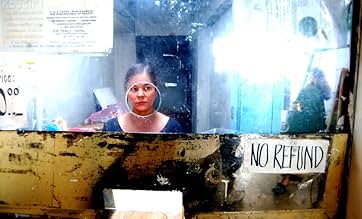IMDb-BEWERTUNG
6,1/10
2024
IHRE BEWERTUNG
Füge eine Handlung in deiner Sprache hinzuThe Pineda family struggles with bigamy, unwanted pregnancy, possible incest, and skin irritations in a dilapidated movie theater.The Pineda family struggles with bigamy, unwanted pregnancy, possible incest, and skin irritations in a dilapidated movie theater.The Pineda family struggles with bigamy, unwanted pregnancy, possible incest, and skin irritations in a dilapidated movie theater.
- Auszeichnungen
- 9 Gewinne & 15 Nominierungen insgesamt
Kristoffer King
- Ronald
- (as Kristofer King)
Dido de la Paz
- Atty. Quintana
- (as Dido Dela Paz)
Buddy Caramat
- Tonette
- (as Buddy Salvador Caramat)
Aaron Rivera
- Ricky
- (as Aaron Christian Rivera)
Empfohlene Bewertungen
Brillante Ma. Mendoza's latest film, "Serbis" (2008), may not even come close to the comparative brilliance of recent Filipino films like Jeffrey Jeturian's "Kubrador", Emmanuel dela Cruz' "Sarong banggi" and, yes, even Chito Rono's "Sukob", but it's still a curious work. For what the film lacks in plot and character development, which are really severely wanting, can be justly compensated by its prescribed milieu, which stands out as a character in itself--the movie theater run by the filmic family (no less named as "Family Theater").
With its dirty and dank hallways, its vandalized walls, its crumpled and faded movie posters, its hideously flooded and murky toilet, its duplicitous screening and projection room, not to mention its regular throng of patrons who may or may not be "there" for the featured film itself and the always-prevalent traffic and crowd noise outside, "Serbis" could've been made--or could be watched--just for this run-down and out-of-luck movie theater. (If this were a good, old classic silent film, then I could've mistaken it as a film about the theater itself.)
Mendoza may have seen--or at least, may have been aware of--Jacques Nolot's "Porn Theater" and Tsai Ming-liang's "Goodbye, Dragon Inn", which his film quite approximates in terms of setting and concern. But even then, "Serbis" doesn't have the self-criticizing humor of the former and the existential elegy of the latter, qualities which, in fairness to Mendoza, he may not have the intention of lending to his film. It's because from the looks of it (I mean literally), "Serbis" may be one of the many far-down-the-way descendants and variations of the Neo-Realist School of Thought (Naturalism, Abjection, Spontaneity, etc). But even then, unlike many of the best works from that venerated film-making method ("La Terra Trema", "The Bicycle Thief", "Shoeshine", "Salaam, Bombay!", "A Woman Under the Influence", "Rosetta", "Riff-Raff", even our own "Insiang", etc), his film actually eludes the capability of being situated in a wider social and political context, not even in a remote manner. Perhaps again, that's something that Mendoza may not even be set on achieving.
To put it bluntly, "Serbis" escapes any explanation, logical or otherwise. To say that it threads on naturalism is to state the obvious. To say that it borders on the absurd is to overstate the matter. To say that it has a radical agenda being rallied is to make the point moot and academic. But then, to dismiss the film as pointless and inconsequential is to underappreciate Mendoza's efforts in coming up with a "different" film like this. I say different in that while it's too lightweight to be considered an "art" film, it's too deliberate to be regarded as "trash" as well. (It wouldn't be selected for competition in this year's Cannes film festival if it didn't have "something" going for it, I guess.)
Still, I don't get it why some of the Cannes press and even the MTRCB here would be so bothered as to express aghast at some of the film's "disgusting" and "explicit" scenes. I contend that a couple of nude and sex scenes are just plain gratuitous, but the "disgusting" scenes being specified by the press are not even worth mentioning as to merit controversy. In themselves, these scenes just don't add up to a film that's already not meant to cohere. "Serbis" is definitely no "Irreversible" and "Humanite".
What can be a source of comfort is the fact that even works of disappointment do have their choice moments of saving grace. In this scant film's case, it's the selected portrayals of Gina Pareno, Jaclyn Jose and, yes, Coco Martin. If these actors are even "acting" in the film, that I don't know. Whenever Gina and Jaclyn (the beleaguered mother and daughter proprietors of the seedy cinema) are in the frame, they really command such a thespic presence, without them exerting so much effort (if there's one), even having themselves willingly sailed (I mean literally) through the muck and mire of the film. The same goes for Coco (the aimless son of the older proprietor), specifically with regards to the factor of being "dirtied" by the film. His character rarely utters a word in the film;most of the time, he's just seen doing "something", quietly and intently. But it's in such activities, I hope, that we get to have a glean of his mental and emotional state--like in the slow and long scene where he cleans the hopelessly recoverable cinema toilet (a part of his being "dirtied" by the film). Even the decried scene where he successfully pops a painful buttock pus using a cola bottle gets to signify a kind of self-epiphany (which leads to his ultimate detachment from his family by the film's end)!
Sadly, such choice moments of portrayal are still undermined by the fact that Armando Lao's script doesn't allow them to become fully-rounded characters as for the viewers to really feel their plight. These characters are made to appear as nothing more than like the strangers and acquaintances who we meet fleetingly and randomly in real life and then care for no more afterwards. If the fairly dignified thespic chops of Gina, Jaclyn and Coco are still led to feel that way, then what more of the other characters? This but true--like the projectionist character of Kristoffer King who is there just to be given a rough blow job by one of the theater's gay patrons and the ticket-booth attendant character of Roxanne Jordan who is there just to brazenly pose in nude in front of the mirror at the film's start. But then, didn't I mention earlier that "Serbis" could be just about the theater itself?
In itself, "Serbis" is a graphic and natural document of a Filipino slice-of-life, but not enough as to become a true piece of cinematic provocation and radicalness as what the majority of films being shown in Cannes are meant to be.
With its dirty and dank hallways, its vandalized walls, its crumpled and faded movie posters, its hideously flooded and murky toilet, its duplicitous screening and projection room, not to mention its regular throng of patrons who may or may not be "there" for the featured film itself and the always-prevalent traffic and crowd noise outside, "Serbis" could've been made--or could be watched--just for this run-down and out-of-luck movie theater. (If this were a good, old classic silent film, then I could've mistaken it as a film about the theater itself.)
Mendoza may have seen--or at least, may have been aware of--Jacques Nolot's "Porn Theater" and Tsai Ming-liang's "Goodbye, Dragon Inn", which his film quite approximates in terms of setting and concern. But even then, "Serbis" doesn't have the self-criticizing humor of the former and the existential elegy of the latter, qualities which, in fairness to Mendoza, he may not have the intention of lending to his film. It's because from the looks of it (I mean literally), "Serbis" may be one of the many far-down-the-way descendants and variations of the Neo-Realist School of Thought (Naturalism, Abjection, Spontaneity, etc). But even then, unlike many of the best works from that venerated film-making method ("La Terra Trema", "The Bicycle Thief", "Shoeshine", "Salaam, Bombay!", "A Woman Under the Influence", "Rosetta", "Riff-Raff", even our own "Insiang", etc), his film actually eludes the capability of being situated in a wider social and political context, not even in a remote manner. Perhaps again, that's something that Mendoza may not even be set on achieving.
To put it bluntly, "Serbis" escapes any explanation, logical or otherwise. To say that it threads on naturalism is to state the obvious. To say that it borders on the absurd is to overstate the matter. To say that it has a radical agenda being rallied is to make the point moot and academic. But then, to dismiss the film as pointless and inconsequential is to underappreciate Mendoza's efforts in coming up with a "different" film like this. I say different in that while it's too lightweight to be considered an "art" film, it's too deliberate to be regarded as "trash" as well. (It wouldn't be selected for competition in this year's Cannes film festival if it didn't have "something" going for it, I guess.)
Still, I don't get it why some of the Cannes press and even the MTRCB here would be so bothered as to express aghast at some of the film's "disgusting" and "explicit" scenes. I contend that a couple of nude and sex scenes are just plain gratuitous, but the "disgusting" scenes being specified by the press are not even worth mentioning as to merit controversy. In themselves, these scenes just don't add up to a film that's already not meant to cohere. "Serbis" is definitely no "Irreversible" and "Humanite".
What can be a source of comfort is the fact that even works of disappointment do have their choice moments of saving grace. In this scant film's case, it's the selected portrayals of Gina Pareno, Jaclyn Jose and, yes, Coco Martin. If these actors are even "acting" in the film, that I don't know. Whenever Gina and Jaclyn (the beleaguered mother and daughter proprietors of the seedy cinema) are in the frame, they really command such a thespic presence, without them exerting so much effort (if there's one), even having themselves willingly sailed (I mean literally) through the muck and mire of the film. The same goes for Coco (the aimless son of the older proprietor), specifically with regards to the factor of being "dirtied" by the film. His character rarely utters a word in the film;most of the time, he's just seen doing "something", quietly and intently. But it's in such activities, I hope, that we get to have a glean of his mental and emotional state--like in the slow and long scene where he cleans the hopelessly recoverable cinema toilet (a part of his being "dirtied" by the film). Even the decried scene where he successfully pops a painful buttock pus using a cola bottle gets to signify a kind of self-epiphany (which leads to his ultimate detachment from his family by the film's end)!
Sadly, such choice moments of portrayal are still undermined by the fact that Armando Lao's script doesn't allow them to become fully-rounded characters as for the viewers to really feel their plight. These characters are made to appear as nothing more than like the strangers and acquaintances who we meet fleetingly and randomly in real life and then care for no more afterwards. If the fairly dignified thespic chops of Gina, Jaclyn and Coco are still led to feel that way, then what more of the other characters? This but true--like the projectionist character of Kristoffer King who is there just to be given a rough blow job by one of the theater's gay patrons and the ticket-booth attendant character of Roxanne Jordan who is there just to brazenly pose in nude in front of the mirror at the film's start. But then, didn't I mention earlier that "Serbis" could be just about the theater itself?
In itself, "Serbis" is a graphic and natural document of a Filipino slice-of-life, but not enough as to become a true piece of cinematic provocation and radicalness as what the majority of films being shown in Cannes are meant to be.
I watched this movie with my filipino wife, she knew a many actors from there. I like the older pinoy movies, however they are mostly depressive and about hard life, but probably since this is not so old movie, it was not so dark. With a little filipinou humour style, i liked it.
This is a film that has no cohesive narrative, really, it's more of a series of snapshots, if you will, of the lives that revolve on a ramshackle movie theater that can be considered as the star of this film, like a living breathing creature that it is, all with its operators and the patrons that frequent it, a place that had seen better days which nobody seems to clearly remember. Actually, only Nanay Flor, (played by Gina Pareño, an actress that in her heydays was quite a vamp) who's an embattled matriarch undergoing divorce proceedings with the unpresent patriarch, still manages to be unperturbed, feathers unruffled (a bravura performance), while others in the building just soldier on and are left just going through the motions. Despite the progress of technology where people can easily find pornographic content on the Internet during the decade of the noughts when this film is set, it still remains but a stubborn bastion of sleaze with its sieve-like fortifications, everybody or anything can get in and out of it in the middle of a noisy city. Noise pollution be damned (at least I could just read the subtitles like other non-Filipino speakers). Such cacophony of sounds, though the unacquainted might find that to be a bit overwhelming, has a higher purpose and it doesn't even matter much whether that was coincidental or contrived. So it is best tho have that immersive mindset as one watches this.
Living in the same country where this film is set, I'm one of those people (though definitely not well-off) fortunate enough to have had my first experience watching cinema alone in my mid-teens in one of those up-scale mall multiplexes, and still does so occassionally to this day, which at the time I'm writing this, that viewing experience is in itself in a state of quandary as streaming services looms to replace the film viewing habits of people globally. Though cannot be considered that bad but it's also not that good either, imho, because I find theaters have that certain charm, and though at times they have their own fair share of annoying co-patrons to deal with amongst other things, the overall experience tend to be on the kinder side.
An evocation of such nostalgia brings to mind the films like Tsai Ming Liang's Goodbye, Dragon Inn or Giuseppe Tornatore's Oscar-winner Cinema Paradiso, their love-letter to cinema both set in the theater space which does not shy away from detailing the seamier side of those experiences. But what we witness in Brilliante Mendoza's socio-realist masterpiece is that there is no energy to spare when it comes to sharing the mawkishness that that the Family Theater matron in the film have manifested. He instead went in and goes straight for the jugular, hastily sending subtlety to vacation to showcase the yuck factor in these kinds of places instead. And one just need and look at the film titles on offer that the theater exhibits. The poor uncouth masses subjected to the indignities of having to endure such filthy places just to ply their wares, in a place where the lower class people's only form of sporting entertainment are catered by these establishments, especially during the pre-Internet era. But a welcome escapism from such bleak narrative was the goat scene which is, like, the best live-action animal cameo I've seen done in the whole of world cinema ever (G.O.A.T., right?), even beats the rooster/chicken chase in Fernando Meirelles' City of God. The gracefulness of that animal as it scampered down that staircase centerpiece was just heavenly hilarious. Unfortunately, that is the only elegant treat in store for this film.
But as for Brilliante Mendoza's reputation as a filmmaker, I feel this has definitely cemented his place as a significant voice in the Philippine film industry. Though I was initially disappointed, having watched Kinatay before this, a film that I felt that something was quite lacking as I watched that one in full, I was left kind of dumbfounded as to what the hoopla surrounded Mendoza receiving that directorial accolade at Cannes. But only after watching this film that immediately preceded it, the more clearer it became to me what reflected their decision to give him those honors, and I couldn't agree more now. The dilapidated chic aesthetic of those two films, I dare say, go well together and should be seen as a double-bill feature instead because the director encapsulated all that needs to said without saying much with those two films he made back-to-back, providing the best way of presenting people who the people living in the Philippines really are, which is a quite very courageous statement.
So this film definitely functions as a quasi-document to express the lament of the silenced masses who have just resigned to their predicament, people that have no other way to voice out their despair, those of whom who don't have any more tears left to shed. Mendoza and his crew has facilitated that for them. So even if the passage of time inevitably replace of those dilapidated structures, at least the likes of me, we have this. Numquam obliviscar.
Rating: (A beta-plus).
Living in the same country where this film is set, I'm one of those people (though definitely not well-off) fortunate enough to have had my first experience watching cinema alone in my mid-teens in one of those up-scale mall multiplexes, and still does so occassionally to this day, which at the time I'm writing this, that viewing experience is in itself in a state of quandary as streaming services looms to replace the film viewing habits of people globally. Though cannot be considered that bad but it's also not that good either, imho, because I find theaters have that certain charm, and though at times they have their own fair share of annoying co-patrons to deal with amongst other things, the overall experience tend to be on the kinder side.
An evocation of such nostalgia brings to mind the films like Tsai Ming Liang's Goodbye, Dragon Inn or Giuseppe Tornatore's Oscar-winner Cinema Paradiso, their love-letter to cinema both set in the theater space which does not shy away from detailing the seamier side of those experiences. But what we witness in Brilliante Mendoza's socio-realist masterpiece is that there is no energy to spare when it comes to sharing the mawkishness that that the Family Theater matron in the film have manifested. He instead went in and goes straight for the jugular, hastily sending subtlety to vacation to showcase the yuck factor in these kinds of places instead. And one just need and look at the film titles on offer that the theater exhibits. The poor uncouth masses subjected to the indignities of having to endure such filthy places just to ply their wares, in a place where the lower class people's only form of sporting entertainment are catered by these establishments, especially during the pre-Internet era. But a welcome escapism from such bleak narrative was the goat scene which is, like, the best live-action animal cameo I've seen done in the whole of world cinema ever (G.O.A.T., right?), even beats the rooster/chicken chase in Fernando Meirelles' City of God. The gracefulness of that animal as it scampered down that staircase centerpiece was just heavenly hilarious. Unfortunately, that is the only elegant treat in store for this film.
But as for Brilliante Mendoza's reputation as a filmmaker, I feel this has definitely cemented his place as a significant voice in the Philippine film industry. Though I was initially disappointed, having watched Kinatay before this, a film that I felt that something was quite lacking as I watched that one in full, I was left kind of dumbfounded as to what the hoopla surrounded Mendoza receiving that directorial accolade at Cannes. But only after watching this film that immediately preceded it, the more clearer it became to me what reflected their decision to give him those honors, and I couldn't agree more now. The dilapidated chic aesthetic of those two films, I dare say, go well together and should be seen as a double-bill feature instead because the director encapsulated all that needs to said without saying much with those two films he made back-to-back, providing the best way of presenting people who the people living in the Philippines really are, which is a quite very courageous statement.
So this film definitely functions as a quasi-document to express the lament of the silenced masses who have just resigned to their predicament, people that have no other way to voice out their despair, those of whom who don't have any more tears left to shed. Mendoza and his crew has facilitated that for them. So even if the passage of time inevitably replace of those dilapidated structures, at least the likes of me, we have this. Numquam obliviscar.
Rating: (A beta-plus).
This film challenges the actors to portray their characters realistically. The story revolves around them and there is no clear climax. Rather, it is a cacophony of events plotting the life of this family living in a run-down theater. They are barely subsistent.
I have a sense of having watched a play because the entire scene takes place in the theater. Camera techniques and lighting has been well placed that it draws the emotion and atmosphere accurately. The use of hand held technique and the background noise gives emphasis to the chaos and discordant lives that is.
Being a low-budget independent film, demonstrates to us that a good movie can be achieved and interpreted such as "SERBIS".
I have a sense of having watched a play because the entire scene takes place in the theater. Camera techniques and lighting has been well placed that it draws the emotion and atmosphere accurately. The use of hand held technique and the background noise gives emphasis to the chaos and discordant lives that is.
Being a low-budget independent film, demonstrates to us that a good movie can be achieved and interpreted such as "SERBIS".
I got very curious of Brillante Mendoza's work after his victory at Cannes for the film "Kinatay". I saw one of his films years before, "Masahista" (The Masseur) and I wasn't really a big fan. I just didn't care much for the style or the storytelling ability. The film was just doesn't show the promise or the makings of a great director. I've heard so much about "Serbis" and "Kinatay". Most of it strong reactions of how raw it is and the director himself was blatant to say that he intends to do the kind of films that you'll either hate or love. I choose to reserve judgment until I get to see both films. After seeing "Serbis", I have to say that Brillante Mendoza improved a lot from the time he made "Masahista". While the film is not outstandingly brilliant or groundbreaking, I definitely saw a lot of promise there. I get the lack of plot. It was intentional, it was meant to be a slice of life, a day in the life of a family in moral decadence. What I don't get is the lack of perspective and "voice". While the director seemingly takes the observation post and chooses to reserve judgment, the fact that you choose what to show in front of the audience is an obvious statement that you're condemning that "immorality" has become a normalcy in the lives of the Filipino people. I know another layer to it that everything is just a parallelism to the Philippine movie industry. I'm not criticizing the judgment but at least if you're going to say something, commit to it rather than putting it as an undertone. Take for example, the kid who took the extra change and lied about it. If the director just really wants to stay on the observation post and reserve judgment, then the camera has no business following the kid. By choosing to show it, you have obviously taken a stand. Not that I'm looking for a rationalization or a justification the cause for the degradation of morality of the whole family but if you're showing it as something wrong, I certainly wouldn't mind a progression on how the lack of morality would drive these people. Putting it on a plain field just makes the whole thing monotonous. I haven't had the chance to see "Kinatay" but from the reviews that I have read, it had the same problem. Brillante Mendoza has the eye and the promise to make it as a great director but if he keeps on serving the same thing and committing the same mistakes, then I wouldn't be surprised he'll soon be buried in the pile.
Wusstest du schon
- WissenswertesDirector Brillante Mendoza revealed that the sex scene between Coco Martin and Mercedes Cabral was simulated. "It was assumed by everyone that in the sex scene there was real penetration. The actors knew how I work, and if they were on a different level of their profession, they probably would have had real sex. But since this was the girl's first film and she's from a conservative family, she had done enough, so there is no penetration. But I wanted people to believe there was actual sexual intercourse, and it was so realistic that people believe that's what happened," he explained.
- Zitate
Nanay Flor: How could you let this idiot impregnate you?
- VerbindungenFeatured in Logos aus der ganzen Welt: Philippines (2016)
Top-Auswahl
Melde dich zum Bewerten an und greife auf die Watchlist für personalisierte Empfehlungen zu.
- How long is Service?Powered by Alexa
Details
- Erscheinungsdatum
- Herkunftsländer
- Offizieller Standort
- Sprachen
- Auch bekannt als
- Service
- Drehorte
- Produktionsfirmen
- Weitere beteiligte Unternehmen bei IMDbPro anzeigen
Box Office
- Bruttoertrag in den USA und Kanada
- 64.536 $
- Eröffnungswochenende in den USA und in Kanada
- 12.824 $
- 1. Feb. 2009
- Weltweiter Bruttoertrag
- 155.156 $
Zu dieser Seite beitragen
Bearbeitung vorschlagen oder fehlenden Inhalt hinzufügen


















